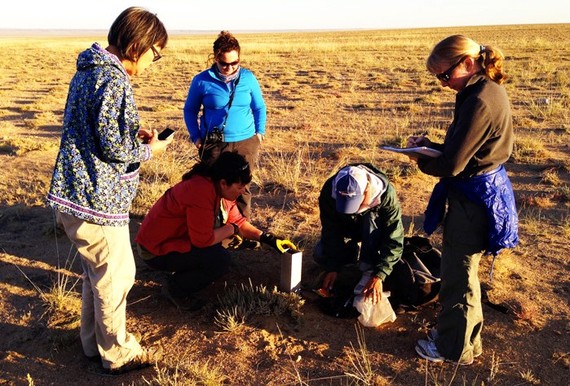I work for Accenture Operations as a global category advisory manager. But I also recently traveled from my home in Grand Rapids, Michigan (U.S.), to Mongolia's Gobi Desert as part of a research project documenting the activities and habitat of a variety of animals inside the Ikh Nart Nature Reserve.
I worked as an Earthwatch Institute Expedition volunteer with a Mongolian Principle Investigator and group of local university students to support the conservation management of the Denver Zoo, helping researchers track the survival habits of the endangered Argali sheep and a variety of small mammals, bats, birds and lizards, as well as the vegetation many of these species depend on to survive. It was interesting to learn how all of these different animals are interconnected and how much just small changes in their environment can really affect them.
Gold mine of information
The flora and fauna across the park are greatly impacted by mining in the region, primarily for coal and gold, which are abundant in Mongolia. Therefore, it's imperative the native species are studied--to the extent the group tagged vultures to study their migratory pattern, which they found extended to South Korea. I primarily studied small animals, even following and recording every move a lizard made for an hour. Moreover, the research we produced will help the Ikh Nart Nature Reserve create new environmental policies for the Mongolian government.
It was a great way to really experience a country and interact with the local population. I enjoyed living in this remote environment while knowing I was making a difference. I've done this kind of work before on an Earthwatch Expedition to Kenya in 2007 where I studied another endangered species, the black rhino, and where I was stalked by a group of buffalo and fieldwork required a 10-kilometer hike across the savannah.
Polo for preservation
When I returned from Mongolia, I helped develop a fundraising event to purchase a Land Rover for the Mongolian student researchers. Some of their Land Rovers have 200,000 to 300,000 km on them. In cooperation with the Denver Zoo, a charity polo tournament was held in London where teams competed for the Genghis Khan Cup. For the fundraiser, which collected $10,000, I applied my Accenture skills and experience, serving as the event's project manager and building a website and Facebook page. We're donating it all to the Ikh Nart Nature Reserve.

